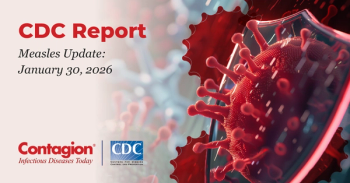
COVID-19 Vaccination Protects Against Severe Clinical Outcomes in Hospitalized Adults
Overall, 91.5% of the hospitalized adults with COVID-19 were unvaccinated and 8.5% of patients were fully vaccinated.
For hospitalized adults with COVID-19 infection, having received a COVID-19 vaccine significantly reduced the risk of severe illness or death compared with not having received an immunization. COVID-19 vaccine protection against severe outcomes was comparable between the Pfizer-BioNTech and Moderna mRNA-1273 vaccines.
Investigators shared these results from a population-based propensity score-matched study in a poster at
The retrospective study was performed using data collected from the Memorial Healthcare System (MHS) in Hollywood, Florida, between June 1 and September 21, 2021, which coincided with the spike in cases caused by the B.1.617.2 (Delta) strain. Participants were divided into 2 groups: vaccinated and unvaccinated, with vaccinated defined as individuals who received 2 doses prescribed by the vaccination protocol with ≥ 14 days administration of the second dose of vaccine before illness onset. For the study’s purposes, unvaccinated was defined as individuals who had no record of vaccination against COVID-19 or partially vaccinated individuals with a single dose vaccination or <14 day after the second dose administration before illness onset>< 14 days after the second dose administration before illness onset.
Investigators matched vaccinated and unvaccinated patients 1:1 and used standardized mean differences with a maximum propensity score probability difference of 10% to evaluate the balance of baseline characteristics between the 2 groups.
A total of 3810 adults were hospitalized with COVID-19 at MHS during the study period. After excluding duplicated cases, deaths, or cases with missing data, 3351 patients were included in the pre-matched cohort (vaccinated n = 284; unvaccinated n = 3067). After propensity score matching 1:1, 524 patients were matched (vaccinated n = 262; unvaccinated n = 262). Thirty-seven received the Moderna vaccine and 225 received the Pfizer-BioNTech vaccine.
Overall, breakthrough COVID-19 infections among the fully vaccinated were much more common in older patients (67% were > 65 years old, 19% were between 55–64 years old, and 14% were < 55 years).
In the group of unvaccinated patients with COVID-19, 29% were > 65 years old, 20% were between 55–64 years old, and 51% were < 55 years.
“Patients with vaccine breakthrough COVID-19 infection had a significantly higher comorbidity profile compared with unvaccinated, including hypertension (85.6% vs. 51.9%), diabetes (45.6% vs. 31.8%), chronic obstructive pulmonary disease (22.2% vs. 5.7%), chronic kidney disease (30.6% vs. 12.4%), ischemic heart disease (36.6% vs. 11.3%), cerebrovascular disease (17.6% vs. 4.8%), malignancy (17.1% vs. 4.4%) and smoking (44.7% vs. 21.1%) (P < .0001),” investigators reported.
Vaccination provides protection against severe clinical outcomes, including severe illness and death compared with no vaccination, the research team concluded.
Newsletter
Stay ahead of emerging infectious disease threats with expert insights and breaking research. Subscribe now to get updates delivered straight to your inbox.
































































































































